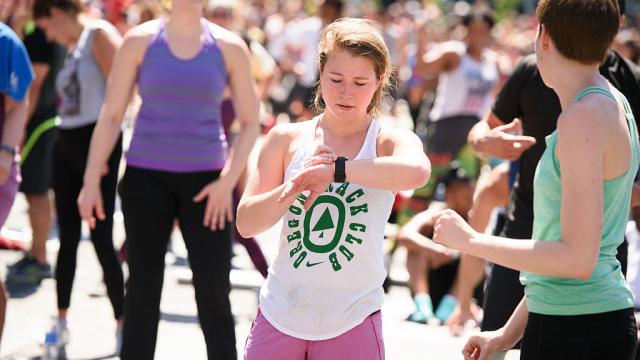A fitness wearable promises to aid you in your quest for a healthier life by providing data on how your body responds to physical activity. They’re good at providing some bits of information and not so good at others. In particular, a new small-scaled study from Stanford University suggests that fitness trackers are not great at measuring calories burned.
Image from Getty
A team of researchers tested the accuracy of seven wrist devices — Apple Watch, Fitbit Surge, Basis Peak, Microsoft Band, PulseOn, Samsung Gear S2 and MIP Alpha 2 — on a pool of 60 volunteers (29 men and 31 women), who were told to walk, run and cycle on treadmills and stationary cycles in the lab. Their goal was to see how accurate heart rate and energy expenditure (AKA calories burned) measurements were for each device.
“The heart rate measurements performed far better than we expected,” said Euan Ashley, an associate professor at Stanford University Medical Center and co-author of the study, “but the energy expenditure measures were way off the mark. The magnitude of just how bad they were surprised me.”
Heart rate data is trustworthy on fitness trackers
The researchers gathered heart rate data from the wearables and compared it to results from an electrocardiograph. The analysis found that six of the seven devices were relatively on point, boasting an error rate under five per cent. Only the Samsung Gear S2 had a higher error rate of 6.8 per cent, while the most accurate device was the Apple Watch.
Calorie data is far from accurate
But when it came to calories lost — which means tracking energy used during a workout — the results were quite different. The researchers compared data from the tracker to that from an instrument that measures oxygen and carbon dioxide in breath to estimate metabolic rate. Of the five devices that offered this additional feature, the range of error was anywhere from 20 per cent to 93 per cent.
According to the scientists, the devices should ideally have an error rate lower than 10 per cent in non-medical settings. None of the tested devices came close. Even the most accurate device, the Apple Watch, was off by an average of 27 per cent. The biggest offender was the PulseOn.
Some subjects were more prone to inaccurate readings than others
The study found specific groups of people to receive a higher rate of error than others, reports NPR. For instance, darker skinned toned people, those with higher BMIs and men had higher error rates than Caucasian women with a healthy weight. The research team doesn’t know why this pattern was seen, but for consumers, this means non-Caucasian individuals, men and those with larger BMIs should be sceptical of their readings.
Additionally, data for cycling was the most accurate and data for walking was the least accurate.
Don’t toss out trackers — just know their strengths and weaknesses
The study, published in the Journal of Personalised Medicine, has an important takeaway for users of fitness trackers — and it isn’t to eliminate them entirely.
According to Ashley, the findings spotlight the importance of understanding that fitness trackers give “rough estimates” when it comes to calories burned. Part of the problem is that body types and metabolism are so different from person to person — a 3km jog for two people can result in completely different energy expenditure based on factors like gender, age, metabolic rate, height and weight.
The findings are particularly valuable information if you actively use your fitness tracker to monitor caloric intake and base your day’s diet off of the data. So just because your fitness tracker says you burned 900 calories doesn’t mean you can afford to eat an entire pizza. And if you’re debating between one of the aforementioned seven devices, the Apple Watch appears to be the way to go.

Comments